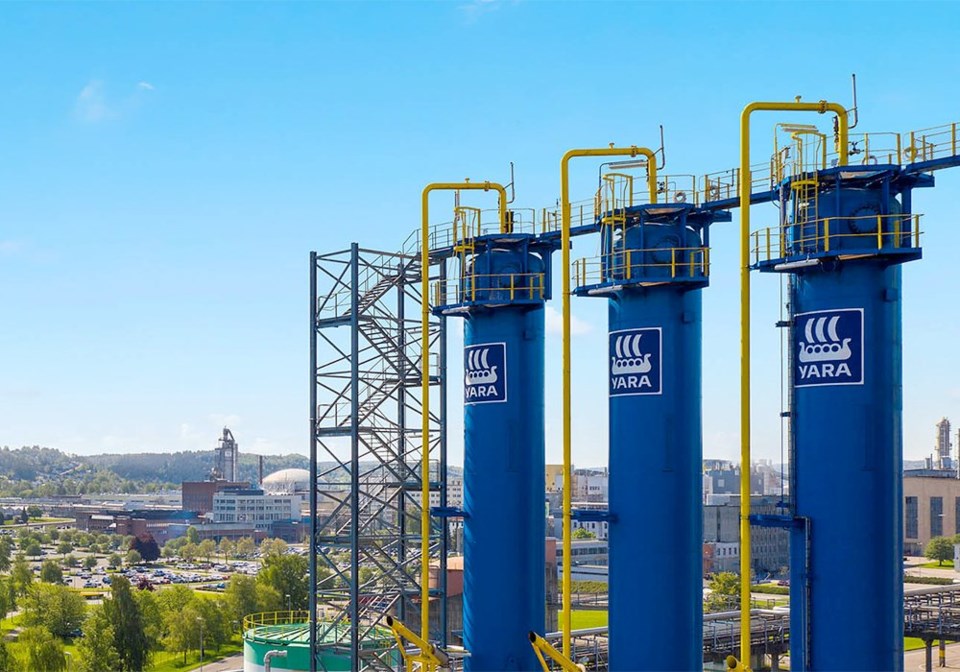WESTERN PRODUCER — Carnage in Europe’s nitrogen fertilizer market is exacerbating the run-up in North American prices but that could change in a heartbeat, says an analyst.
“Buckle up for the ride,” said Josh Linville, analyst with StoneX.
“I hate to say it, but I think volatility is here to stay for the foreseeable future.”
The European Union’s nitrogen fertilizer output is being slashed by an estimated 400,000 to 500,000 tonnes per month, according to an Argus Media analysis.
It started with shutdowns in Poland but has since spread across the region as companies such as Achema, Yara and Borealis shutter their plants.
The curtailment includes urea, ammonium nitrate, calcium ammonium nitrate and urea ammonium nitrate (UAN) plants.
“By a conservative estimate, Europe will soon be operating less than half of its installed capacity to produce these products — unprecedented even for the seasonally low demand period over summer,” stated the company in its recent Argus Insight: Fertilizers report.
The crisis has affected some products more than others. Less than 30 percent of UAN production capacity is expected to be operating by the start of fall.
“The relative abundance of cheaper U.S. supply is replacing some of the lost volume, although by no means all of it,” said the firm.
European-wide urea production is operating at one-quarter of normal capacity. Only two million of the region’s eight million tonnes of production capacity are expected to remain operational.
Linville thinks the situation is even more dire. He believes the EU is operating at 20 percent of its overall production capacity.
“We’ve lost Europe. We’ve lost an entire region,” he said.
The EU accounts for five percent of global urea production, 8.3 percent of anhydrous and 21 percent of UAN output.
That means the EU will be a fierce competitor for available supplies in the export market, which will be reflected in prices.
Prices have already climbed substantially over the summer. The average price for urea on a barge in New Orleans has risen to US$711 per short ton, up from $470 in the middle of June.
Linville thinks there could be even more upside if the EU curtailments continue.
“The flipside of it is Europe can change in an instant,” he said.
Ukraine’s recent counteroffensive against Russia’s occupation has been successful and some politicians in Russia are now calling for the removal of President Vladimir Putin.
The key driver of Europe’s nitrogen fertilizer woes is Russia’s shutdown of the Nord Stream 1 natural gas pipeline. Natural gas is the most commonly used feedstock to make ammonia and urea.
But if there is a change in power in Russia and the pipeline to Europe starts flowing again, nitrogen fertilizer prices around the world would fall sharply and quickly, said Linville.
“Frankly, with the way the last two years have happened, I’m not going to sit there and say there’s no way that happens, because every time we’ve ever thought that, the market humbles us very, very quickly.”
In the meantime, Europe is going to be scrambling to source nitrogen fertilizer products from around the world and it will likely get the volumes it needs.
“Supply is inelastic, suggesting demand destructions in other regions would be needed,” said Argus.
The major urea reserve capacity is located in China, which has been suppressing exports since last year to avoid domestic price inflation. That policy shows no sign of changing.
Argus said an extended period of demand destruction in other markets is likely. That will likely be concentrated in markets with few grain exports or fertilizer subsidies.
Contact [email protected]

